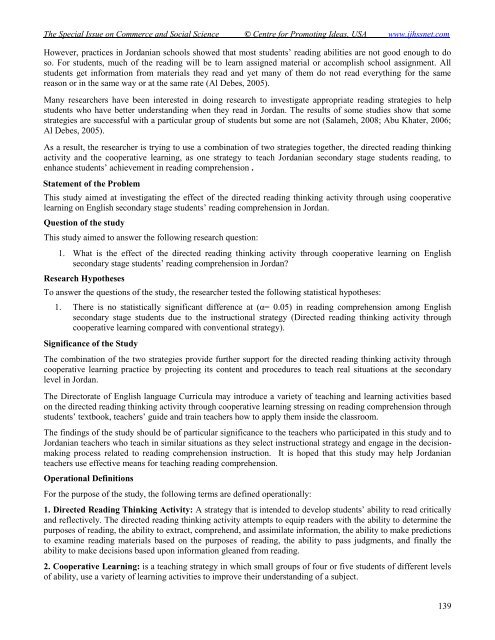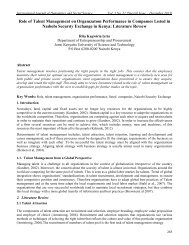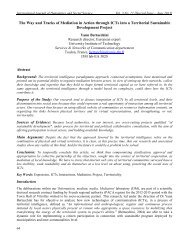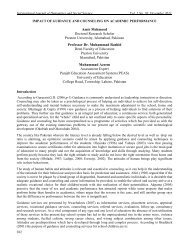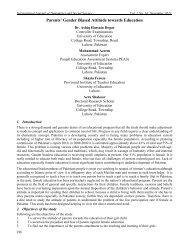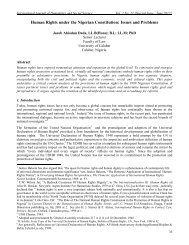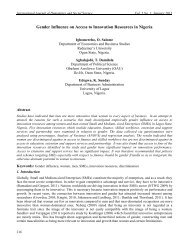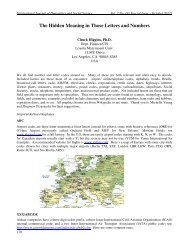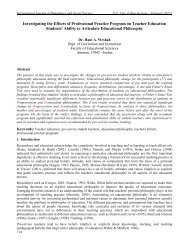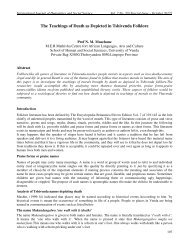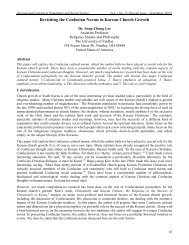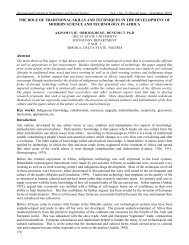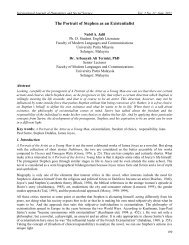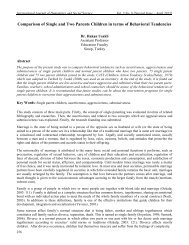The Effect of the Directed Reading Thinking Activity through ...
The Effect of the Directed Reading Thinking Activity through ...
The Effect of the Directed Reading Thinking Activity through ...
You also want an ePaper? Increase the reach of your titles
YUMPU automatically turns print PDFs into web optimized ePapers that Google loves.
<strong>The</strong> Special Issue on Commerce and Social Science © Centre for Promoting Ideas, USA www.ijhssnet.com<br />
However, practices in Jordanian schools showed that most students’ reading abilities are not good enough to do<br />
so. For students, much <strong>of</strong> <strong>the</strong> reading will be to learn assigned material or accomplish school assignment. All<br />
students get information from materials <strong>the</strong>y read and yet many <strong>of</strong> <strong>the</strong>m do not read everything for <strong>the</strong> same<br />
reason or in <strong>the</strong> same way or at <strong>the</strong> same rate (Al Debes, 2005).<br />
Many researchers have been interested in doing research to investigate appropriate reading strategies to help<br />
students who have better understanding when <strong>the</strong>y read in Jordan. <strong>The</strong> results <strong>of</strong> some studies show that some<br />
strategies are successful with a particular group <strong>of</strong> students but some are not (Salameh, 2008; Abu Khater, 2006;<br />
Al Debes, 2005).<br />
As a result, <strong>the</strong> researcher is trying to use a combination <strong>of</strong> two strategies toge<strong>the</strong>r, <strong>the</strong> directed reading thinking<br />
activity and <strong>the</strong> cooperative learning, as one strategy to teach Jordanian secondary stage students reading, to<br />
enhance students’ achievement in reading comprehension .<br />
Statement <strong>of</strong> <strong>the</strong> Problem<br />
This study aimed at investigating <strong>the</strong> effect <strong>of</strong> <strong>the</strong> directed reading thinking activity <strong>through</strong> using cooperative<br />
learning on English secondary stage students’ reading comprehension in Jordan.<br />
Question <strong>of</strong> <strong>the</strong> study<br />
This study aimed to answer <strong>the</strong> following research question:<br />
1. What is <strong>the</strong> effect <strong>of</strong> <strong>the</strong> directed reading thinking activity <strong>through</strong> cooperative learning on English<br />
secondary stage students’ reading comprehension in Jordan?<br />
Research Hypo<strong>the</strong>ses<br />
To answer <strong>the</strong> questions <strong>of</strong> <strong>the</strong> study, <strong>the</strong> researcher tested <strong>the</strong> following statistical hypo<strong>the</strong>ses:<br />
1. <strong>The</strong>re is no statistically significant difference at (α= 0.05) in reading comprehension among English<br />
secondary stage students due to <strong>the</strong> instructional strategy (<strong>Directed</strong> reading thinking activity <strong>through</strong><br />
cooperative learning compared with conventional strategy).<br />
Significance <strong>of</strong> <strong>the</strong> Study<br />
<strong>The</strong> combination <strong>of</strong> <strong>the</strong> two strategies provide fur<strong>the</strong>r support for <strong>the</strong> directed reading thinking activity <strong>through</strong><br />
cooperative learning practice by projecting its content and procedures to teach real situations at <strong>the</strong> secondary<br />
level in Jordan.<br />
<strong>The</strong> Directorate <strong>of</strong> English language Curricula may introduce a variety <strong>of</strong> teaching and learning activities based<br />
on <strong>the</strong> directed reading thinking activity <strong>through</strong> cooperative learning stressing on reading comprehension <strong>through</strong><br />
students’ textbook, teachers’ guide and train teachers how to apply <strong>the</strong>m inside <strong>the</strong> classroom.<br />
<strong>The</strong> findings <strong>of</strong> <strong>the</strong> study should be <strong>of</strong> particular significance to <strong>the</strong> teachers who participated in this study and to<br />
Jordanian teachers who teach in similar situations as <strong>the</strong>y select instructional strategy and engage in <strong>the</strong> decisionmaking<br />
process related to reading comprehension instruction. It is hoped that this study may help Jordanian<br />
teachers use effective means for teaching reading comprehension.<br />
Operational Definitions<br />
For <strong>the</strong> purpose <strong>of</strong> <strong>the</strong> study, <strong>the</strong> following terms are defined operationally:<br />
1. <strong>Directed</strong> <strong>Reading</strong> <strong>Thinking</strong> <strong>Activity</strong>: A strategy that is intended to develop students’ ability to read critically<br />
and reflectively. <strong>The</strong> directed reading thinking activity attempts to equip readers with <strong>the</strong> ability to determine <strong>the</strong><br />
purposes <strong>of</strong> reading, <strong>the</strong> ability to extract, comprehend, and assimilate information, <strong>the</strong> ability to make predictions<br />
to examine reading materials based on <strong>the</strong> purposes <strong>of</strong> reading, <strong>the</strong> ability to pass judgments, and finally <strong>the</strong><br />
ability to make decisions based upon information gleaned from reading.<br />
2. Cooperative Learning: is a teaching strategy in which small groups <strong>of</strong> four or five students <strong>of</strong> different levels<br />
<strong>of</strong> ability, use a variety <strong>of</strong> learning activities to improve <strong>the</strong>ir understanding <strong>of</strong> a subject.<br />
139


